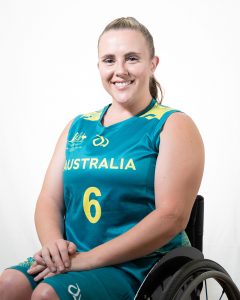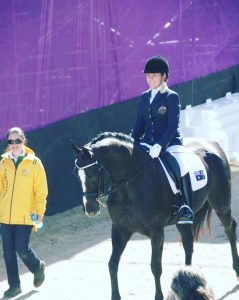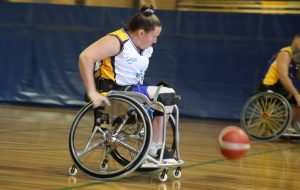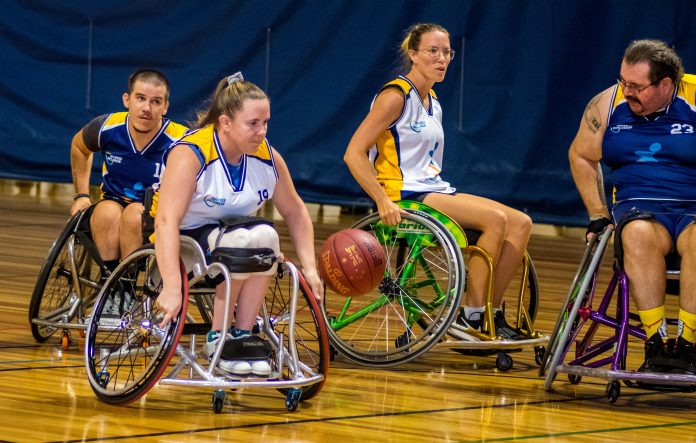Sippy Downs’ Hannah Dodd capped a remarkable transformation at her second Paralympics, switching from equestrian to wheelchair basketball.
The 29-year-old competed on horseback at London in 2012, before turning her attention to the court for Tokyo.
Born with sacral agenesis, Hannah never let the spine disorder hold her back.
“I felt really lucky as a child. My parents let me do whatever I wanted on the farm (west of Sydney) and I ran around with my brothers and rode horses with them,” she said.
Her first horse ride was at four months old, and she embraced any opportunity to get in the saddle while growing up.
“It put a smile on my face … and I think I enjoyed the fact that no-one knew I was disabled when I was on the horse,” she said.
“Even as I got older, I enjoyed the fact I was just another rider, not someone with a disability who was riding.”
She started competing in para-equestrian events as a 12-year-old and joined the Australian squad a year later, as the youngest invitee to that team.

Hannah started to make her mark on the national and international scene, before her life took another dramatic turn.
She was diagnosed with Peripheral Neuropathy (a nervous system disorder) as a 16-year-old and she became an incomplete quadriplegic.
“So, I had to learn how to deal with that,” she said.
“I was struggling how to be an adult but also how to work in a very new body.
“It was definitely very hard, trying to figure that out.”
She started using a wheelchair full-time when she was 22.
“It was a big adjustment to life, sitting down, but I’ve been very lucky to have a supportive family, who have not held me back,” Hannah said.
“They have said: ‘if you want to do it, then do it, and we’ll make it work for you.”
Ever-determined, she earned a place in the Australian para-equestrian team for the London Paralympics.
“It was something I’d dreamed of since the Sydney Paralympics,” she said.
“We drove to Horsley Park to watch it in 2000 and I was like: ‘I want to do this.
“For it to come true 12 years later was a massive thing for me.”

She finished just outside the top-10 there, despite some setbacks.
“Pretty much everything that went wrong could have gone wrong,” she said,
Hannah’s horse got sick on the way there, and she became ill while in London.
“I was antibiotics, just to keep ticking over,” she said.
“It was disappointing not to perform at our best and we were still within a reach of a medal.”
The experience and outcome spurred her on.
“It lit a fire in me. I wanted to go back to the Paralympics and do it properly,” she said.
Follow us on Facebook: www.facebook.com/scnews2020/
While in London, her parents were approached by Gliders’ coach Gerry Hewson and she was invited to try wheelchair basketball.
“When I returned to Australia, I got bored pretty quickly so I decided to give it a go,” Hannah said.
“Doing it for fun didn’t last long. I started playing competitively and it went from there.”

Hannah emerged as one of the top wheelchair basketballers in the country, making her debut for Australia in 2016.
She is among players who are classified with the highest level of impairment, as a 1-point player in a team comprised of 14 points.
Help keep independent and fair Sunshine Coast news coming by subscribing to our free daily news feed. All it requires is your name and email. See SUBSCRIBE at the top of this article.
So, her role with the Gliders is largely to “be a pest” to opposing sides.
“My main job in the team is to essentially get the big guys in to shoot, to set screens for them and generally be a pest to the other teams,” she said.
The Gliders were scheduled to compete in a 9th-10th playoff on Tuesday, after falling to consecutive defeats in the preliminary rounds.
Meanwhile, a handful of other Sunshine Coasters are celebrating medal-winning efforts at Tokyo.
Swimmers Ben Hance and Ruby Storm helped Australia secure a silver in the S14 mixed 4x100m freestyle relay, Katja Dedekind claimed bronze in the S13 400m freestyle and para-cyclist Alistair Donohoe snared a silver in the C5 4km individual pursuit.





